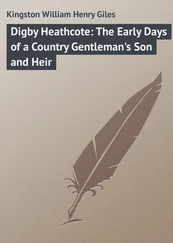2
The following morning the icicles were still there. Every eave had them. They hung in clusters from poles and from the elbows of trees. Where the snow had melted from the faces of the traffic signs, the icicles were spindly, but they emerged from spouts like muscular arms and clung to the gutters in dense strings. The sky was clear again, the cold continuing, and the snow remained deep on the roofs. Good growing weather, Fender thought, letting his breath seep from his mouth. It was simply a question of how much weight their stems would hold. Or had they stems? Parsnips, he remembered, were white. Under a faucet a cone. It put him in mind of caves. From floor to ceiling. Like sets of teeth. And there was scarcely a breeze. The impulse to see if his own string had survived the night was very strong when he awoke. His concern surprised him and he thought there was something wrong with the feeling, something silly, childish almost — yes, childish, that was right; moreover he blamed the icicles for his having slept badly and for the struggle he’d had to prevent himself from drawing the curtains first thing like a fool. The impulse had come on before he was slippered even, had grown while he used the bathroom, become clamorous while he dressed and had his juice, so that he took no pleasure in anything, but thought of the icicles and whether they were safe and whether he was picturing their lengths correctly, except that occasionally, as if there was some connection, he would remember the list in his pocket and all the tasks he’d failed to do, the endless number of things put off: bills, letters, papers, phone calls, errands, odd jobs — god, he was showing a house to a couple at when? ten? eleven — a regular dog’s house — Ringley — empty all winter — fine, damn fine — in bad shape now — dark, cold, walrus-jawed Ringley… who was it hunted caves? some funny name… gah, to crawl through holes in the earth like worms, who knew what you’d come on? water dripping somewhere and the white pouches of spiders — adventure, they called it… nothing like the fire of the mountain, at least as he saw it, the glittering air, distance sloping brilliantly away…. Then a vision of an immense snowfield triumphed briefly in Fender, blinding him pleasantly, and he stretched to tiptoe, meaning to look, it was stupid to fight oneself over such a thing, Ringley, three floors of basement, a park for bats… and the appointment would run through lunch most likely…. He ought to catch up on the figures but what was the use, no one wanted a place like that. This pair, these people: who were they? they wouldn’t want it — a trap…. Pearson should tell Clara to sell it herself, he wasn’t a wizard, for heaven’s sake. Look, Pearson, I’m no magician and that place is a pumpkin; it’s full of rats, well anyway mice, they leave their droppings on the kitchen counters — not a chance…. So he’d hear Pearson preach the power of imagination: Fender! think what you’re selling! happiness is our commodity! you want to dream for them — dream! But Fender remembered how a Baby Ruth wrapper had ruined a sale, it had gone through their dreams like a brick…. He ought to have made those calls, Pearson would ask him about them. No dice, Mr. Pearson, nothing doing there, he’d have to say, while Glick grinned greenishly — soaked in dill…. He could use his tape and if they were still there, he could measure them, that would be interesting — to know how large.
Then another thing I do is I always draw a picture of the house, a simple floor plan. Take this away with you, I say, it’ll help you remember; and let me tell you, they’re grateful. And another thing I always do is I always… but Glick is not listening, he is looking away — the newer, the younger man, he has his sharp eyes stuck in something. Glick? I hope you don’t think Pearson’s taught me all I know about this business. Not by a long shot. I always try to think of a way they can save, trim, cut some corner — a fifth one — so they’ll believe they can safely spend their money on the four I’m selling; it gives them the right feeling; they’ve got to have the right feeling — it’s an art — it takes years. Well… Ah… Glick? I’ve picked up a few things myself, you know, yes sir. Pearson can’t tell you everything. But Glick was not listening to Pearson either, even when Pearson spoke directly to him and Glick looked serious and nodded and the muscle in his jaw jumped. He never listened; even when Pearson told his joke and Glick surfaced his troubled, obsequious face like a fish to receive it, his ears were full. Well you’ll want to know what things, I suppose, a fellow just starting out like you are, learning the ropes, getting the feel, you’ll want to cotton on to what you can, the accumulated wisdom, as they say, well that’s what civilization is, I guess, knowledge handed on, isn’t it? experience of the years; elders, betters, eh?… Glick? For instance, sizes. Damn, he was deaf as his flowers. Fender had wanted to take him under his wing. How foolish that was. He was a bramble, a burr. Awf — sharp, he never scratched himself except in pleasure. Sizes of rooms, Glick — think. You want to have them right here, see, on the tip of your tongue — living room: twenty-four by fifteen; master bedroom: thirteen and a half by eleven and a fourth; kitchen: nine by five; bath: six by four, and so on… sizes. The dining room is a spacious square, an elegant and useful twelve. Make it sound professional. Smooth. That siding, see? that’s one-by-four t-and-g resawn redwood, my good friend, there’s no better. Your clients are thin with the worms of worry, skinny from the scares inside them. Fatten them on certainty. They want to believe. This closet? It’s twenty-two deep — that’s standard. You say that — you say it’s standard — even if it isn’t. Next the missus’ll want to know whether she can get her what-not in that corner. Quick — the facts! the figures! you rattle off the sizes. Twelve hundred square feet of living space. You’re buying a house, here, Mr. Ramsay, you say, laughing, at only nine bucks a yard. Yes sir, sizes. Gives them confidence. They see your concern. I tell you they’re worn; they’re wires; worry is crawling through them, breeding; they want to believe. So: height of the ceilings. Width of the windows. Here’s a fellow who knows, they think, someone really familiar with his property, someone who has the facts at the tip of his tongue, someone who’s been around and understands the market, someone we can trust. It works, Glick. It has quite an effect. Try it out. One try’ll convince. You feed them facts as sharp as needles. You surprise them. See this piece of pipe, Mr. Ramsay, it’s six feet long. You know how important that sort of thing is — I mean how far your water travels. It flabbergasts them, Glick. Yes sir, it sets them on their ears.
But Glick was not listening… awash in his barrel, sunning himself in brine.
Fender had triumphed over himself, he had managed not to look, so that now, while the engine of his car was warming, he was able to enjoy the icicles thoroughly, and he thought it was perhaps this righteousness that had driven out the sense, always present and dominant before, that icicles were, after all, well, icicles; yet he could not help noticing that his were longer than any of his neighbors’—they were grander in every way — and since the weather had been considerate enough to remain fine, they would certainly continue growing, they might even double themselves during the day — it was purely a question of how much weight their stems would bear. He tried to remember when he’d last paid icicles any mind — in his childhood sometime, surely — but his memory failed him, he was left with a blank. There was a house, doubtless, somewhere, he’d lived in, but he’d lost the address. Even now his life slid swiftly by and was soon out of sight like a stick on a river. It vanished so completely, in fact, that at a party once, when he was asked as a part of a game to compose his autobiography, he’d had to answer that he couldn’t tell the story of his life because he couldn’t in the least remember it. At this confession everyone laughed strenuously, warming him with shame and pleasure, but it was not a joke, the remark was true, even if he’d recognized its truth himself only at the moment he was making it, and the idea frightened him a bit, though he forgot about it finally along with everything else: the party, his unmeant wit, its small surprise, the anxiety that was a consequence of it, and his smoothly disappearing life. He did remember that at first he’d had the same fear of the icicles he’d had from time to time of sharpened pencils — that one might pierce his eye. There was no discomfort in his gaze now, however, only pride, and when he felt the cool mass of the tape measure against his thigh, he had to triumph over himself again. What would people think if they saw him… anyone passing… Pearson conceivably? He wished his icicles were growing on the other side — within — where he might measure them in private, examine them in any way he liked. But if one broke off… The thought was dismaying. Really — good heavens — look here, he exclaimed quite aloud, ducking into his car, you’re not right, Fender, old fellow and friend, one of these days they’ll be taking you away… and he backed in reckless bursts out the snowy drive.
Читать дальше












